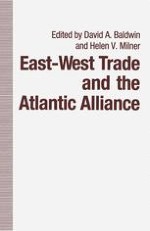
1990 | OriginalPaper | Buchkapitel
CoCom and American Export Control Policy: The Experience of the Reagan Administration
verfasst von : Michael Mastanduno
Erschienen in: East-West Trade and the Atlantic Alliance
Verlag: Palgrave Macmillan UK
Aktivieren Sie unsere intelligente Suche, um passende Fachinhalte oder Patente zu finden.
Wählen Sie Textabschnitte aus um mit Künstlicher Intelligenz passenden Patente zu finden. powered by
Markieren Sie Textabschnitte, um KI-gestützt weitere passende Inhalte zu finden. powered by
In the postwar era, East-West trade has proven to be among the most divisive issues confronting the Atlantic Alliance. The United States and its West European allies have differed significantly with regard to their economic interest in East-West trade, their perception of the political or strategic utility of controlling such trade, and their overall conception of the relationship between East-West trade and national security. American officials have generally favored broader and deeper restrictions on trade than have other members of the alliance. During the cold war (1949–69) and again in the early years of the Reagan administration, US officials favored a strategy of economic warfare, or the use of broad export restrictions to retard the growth of the Soviet economy. Alternatively, the US at various times has pursued a linkage strategy, seeking to condition trade in accordance with Soviet domestic or foreign behavior. Other Western governments generally have found neither strategy appealing and have resisted US efforts to obtain their cooperation.1 As the disputes over Afghanistan, Poland, and the pipeline suggest, such efforts have resulted in significant conflict and confrontation in the Alliance.